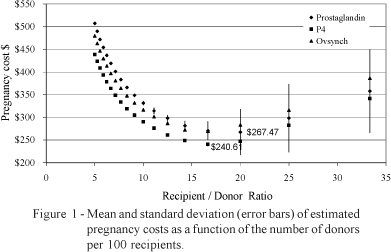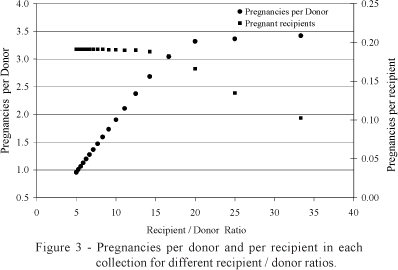Purchase and maintenance of recipient females account for a large proportion of the costs and determine the number of calves that can be produced in an embryo transfer program. However, the large variability of embryo production by the donors and the need to purchase and synchronize the recipients before knowing the number of embryos collected make it difficult for the decision maker to identify the ideal number of recipient females to allocate. An ex-ante evaluation to determine the optimal number of recipient females was carried out through a sensitivity analysis for the ratio between the number of recipients and donors in a simulation model. The variability for the number of embryos collected was accounted for by applying the Monte Carlo simulation technique, assuming normal distribution and known values for mean and variance. The simulation considered monthly intervals between collections, during a 24 months program. The effect of embryo freezing on the number of pregnancies was considered by introducing a stock of frozen embryos into the mathematical model. Optimal recipient/donor ratio and the cost per pregnancy were compared for three recipient synchronization protocols (prostaglandin, progesterone - P4 and Ovsynch), based on the expected performance for synchronization, conception and transfer/treated rates for each protocol. Stochastic simulation associated with sensitivity analysis was effective in identifying the optimal donor to recipient ratio. Freezing embryos is effective to reduce the operational costs per pregnancy. The estimated optimal recipient/donor ratio was 20 for prostaglandin and 16.7 for the other protocols. The P4 protocol, although the most expensive, resulted in the lowest pregnancy cost estimation followed by prostaglandin and Ovsynch.
Monte Carlo; mathematical model; simulation; cost estimation; estrus synchronization







